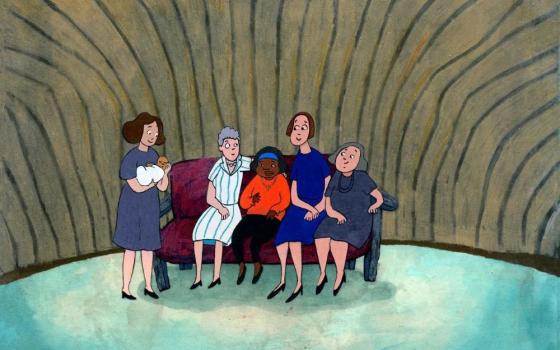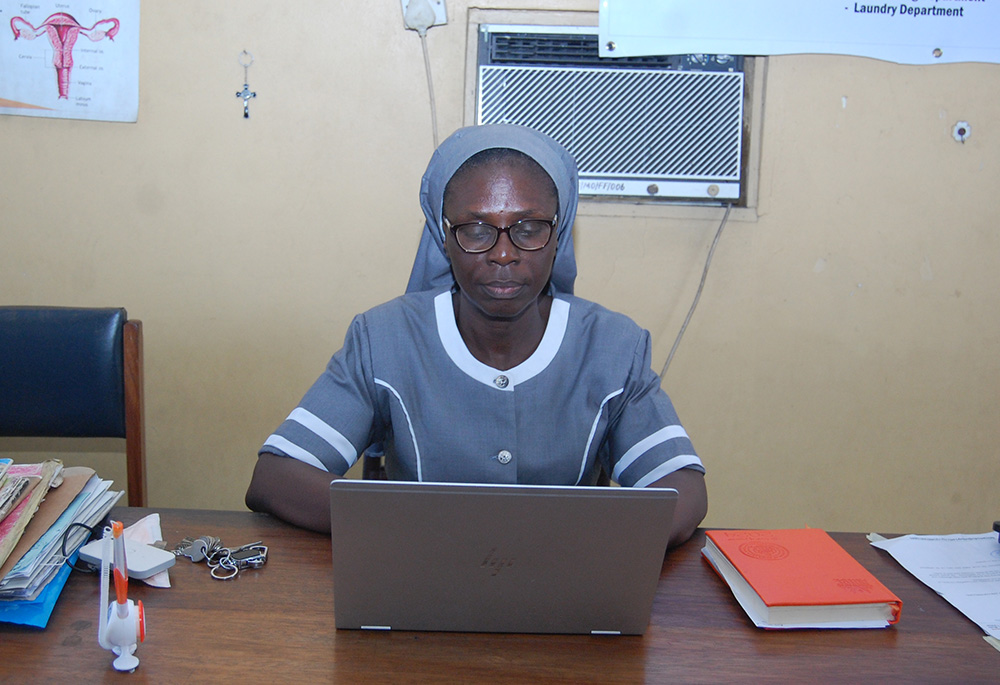
Medical Missionaries of Mary Sr. Maria Obotama, who manages the Family Life Center, in her office. The sisters provide free obstetric fistula surgeries, family planning and maternal health services to women in Mbribit Itam, Nigeria. (Valentine Benjamin)
Sr. Maria Obotama, a member of the Medical Missionaries of Mary, is providing obstetric fistula repairs at the Family Life Center in Mbribit Itam, Nigeria, where women receive free treatment. She took on the role of coordinator at the Family Life Center on April 7, 2022, having previously served as the coordinator at the Medical Missionaries of Mary Primary Health Care Center in Fuka, Nigeria. Since her arrival, she has successfully overseen surgeries on over 500 women.
Born into a family in the small town of Oruk Anam, Nigeria, at St. Mary's Hospital, which is managed by the sisters of the Medical Missionaries of Mary. Obotama is the fourth child and the first daughter in a family of seven.
"My mom often took me to the convent instead of a hospital since there were no phones back then. She would knock on the door and ask for a sister, who would then help her get the care I needed at the hospital," Obotama told Global Sisters Report.
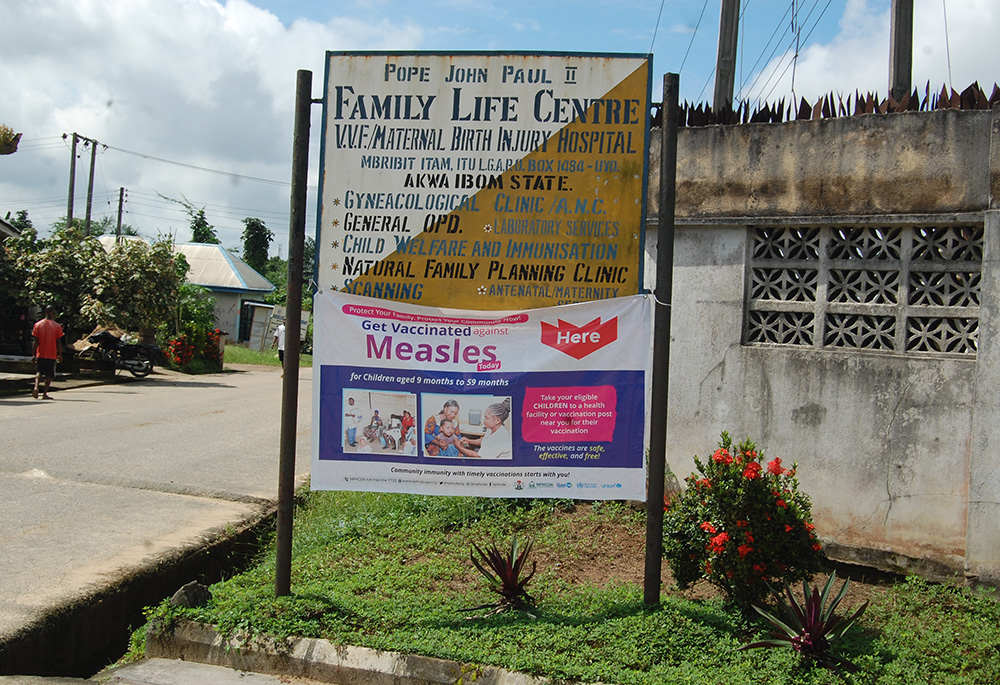
The Family Life Center, run by sisters of the Medical Missionaries of Mary in Mbribit Itam, Nigeria, offers free surgeries to women with obstetric fistula and treats other health issues. (Valentine Benjamin)
"I clearly remember Sr. Zita Tumi, of blessed memory, caring for my brother after his bicycle accident. The gentle way she treated his wound and spoke to us was truly heartwarming and uplifting. Her kindness and encouragement left a lasting impact on both of us. That experience played a crucial role in solidifying my decision to pursue a life dedicated to service."
The Family Life Center also offers vocational training in various skills such as soap making, baking buns, preparing fried snacks like chin chin, packaging peanuts, creating liquid antiseptic, hair styling and clothing production. Women who are patients of the center are allowed to stay in a transit shelter to participate in this training, which Obotama calls "camp."
Obotama spoke to Global Sisters Report about her work at the Family Life Center.
GSR: Can you explain obstetric fistulas, and how they affect women?
Obotama: An obstetric fistula is an abnormal opening between a woman's genital tract and her urinary tract or rectum. This condition is closely related to one of the leading causes of maternal mortality, which is obstructed labor.
When we talk about obstetric fistula, we specifically mean vesicovaginal fistula, which is an abnormal connection between the bladder and the vagina, resulting in continuous urinary leakage and rectovaginal fistula, another type that involves an abnormal connection between the rectum and the vagina, leading to persistent leakage of stool.
How do these conditions affect women?
The constant leakage, whether it's urine or feces, has a profound impact on women's lives. Beyond the physical aspect, women may experience significant emotional trauma. Many find it difficult to move around due to nerve damage or social stigma. They often face rejection from their communities; husbands, families and friends might abandon them due to the persistent foul odor associated with these conditions. Consequently, some women are unable to continue their work in agriculture or trade, leading to financial instability as well.
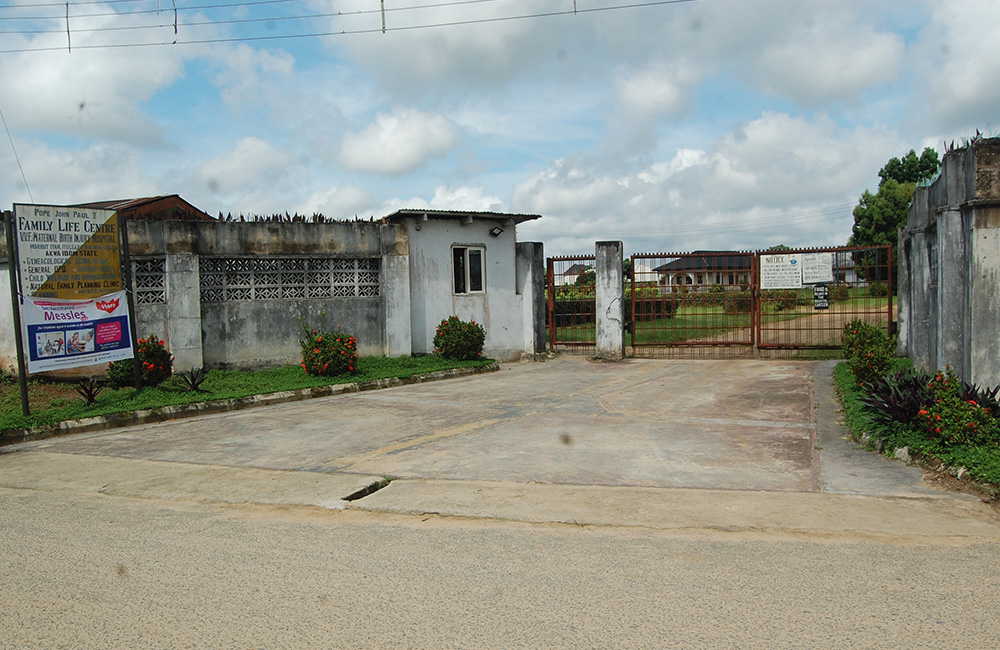
Entrance gate to the Family Life Center where sisters of the Medical Missionaries of Mary provide free obstetric fistula surgeries to indigent populations in Nigeria's southern state of Akwa Ibom. (Valentine Benjamin)
Research shows that obstetric fistulas often result from unattended or poorly managed deliveries by health professionals. Does this also relate to young women being forced into early marriages?
Yes, that's correct; this can involve both skilled and unskilled professionals. Young women are particularly at risk if they are married or become pregnant before they are physically, economically and socially mature enough for childbirth. Also, harmful cultural practices and lack of access to antenatal care can exacerbate the situation.
Many women in Nigeria with fistulas often go to traditional healers and religious sites for treatment. Why do they seek help from unskilled practitioners despite the risks?
The primary reason is often poverty. Many women prefer traditional birth attendants because they are local and more accessible. These attendants may accept payment after the delivery. Transportation to a health care center can be a challenge in rural areas, making it easier to seek care from unskilled birth attendants. Spiritual beliefs also play a role; some women trust in their faith, believing that visiting healers recommended by their religious leaders will lead to better outcomes. So, they choose to seek help from spiritual healers and churches instead of going to hospitals.
Their prophets and pastors might have warned them that visiting a hospital could lead to serious consequences, and they fear that a surgical knife could bring death. This fear often prevents them from seeking necessary medical care, leaving them uncertain and unaware of their true situations.
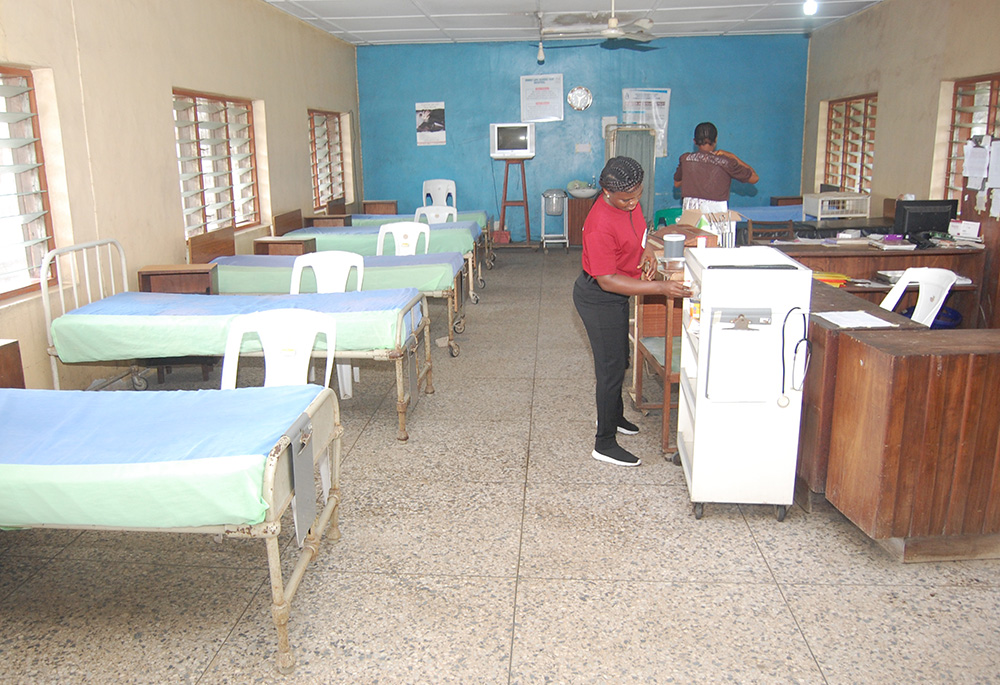
The Family Life Center has 64 beds where patients are kept for observation after treatment. The sisters offer free obstetric fistula repairs, maternal health care and family planning services to indigent citizens in Mbribit Itam, Nigeria. (Valentine Benjamin)
Nigeria is currently facing a significant backlog of nearly 400,000 obstetric fistula cases. How has the Family Life Center provided patient care?
At the Family Life Center, we have been working tirelessly since the early '90s to address this issue. Our center focuses on raising awareness through various channels, including markets, churches, schools and radio programs. We actively engage with communities to highlight the importance of good antenatal care and encourage hospital births.
We also provide repair services for women suffering from obstetric fistulas, which we now offer regularly rather than just during camps. With a surgeon available on-site, we can treat women as soon as they arrive without making them wait for our scheduled camps. We offer comprehensive care and support to ensure their recovery.
For those interested in rehabilitation, we've recently introduced programs that teach skills such as making pastries like chin chin and puff-puff. This short-term skillset not only empowers women but also allows them to sell their products effectively.
Advertisement
What messages would you like to share with other women dealing with fistulas, and what changes would you like to see in how obstetric fistulas are addressed in Nigeria?
My message to those who are struggling is not to give up, and those who have yet to receive treatment, I urge them to seek out the many corrective centers available in Nigeria. If they are living with conditions like VVF or RVF, it's important to get them repaired.
I want to emphasize that it's entirely possible to return to normal life after treatment. Regardless of what others may say, they should keep their hope alive and strive to reintegrate into society. Many women have undergone repairs and have gone on to lead successful lives; some are even starting their own businesses, like sewing and hairstyling. It's absolutely possible to reclaim their lives post repair.





